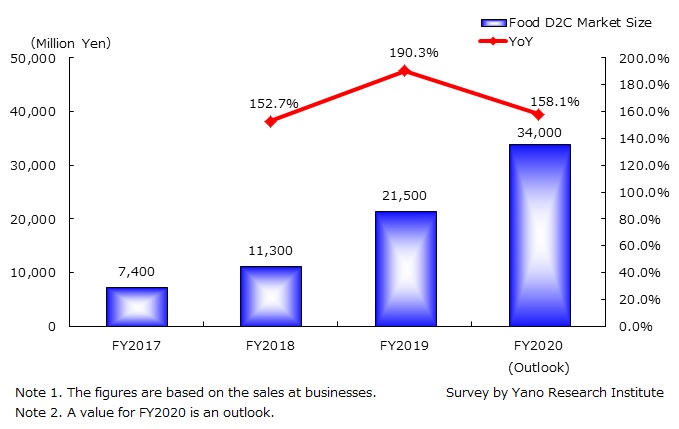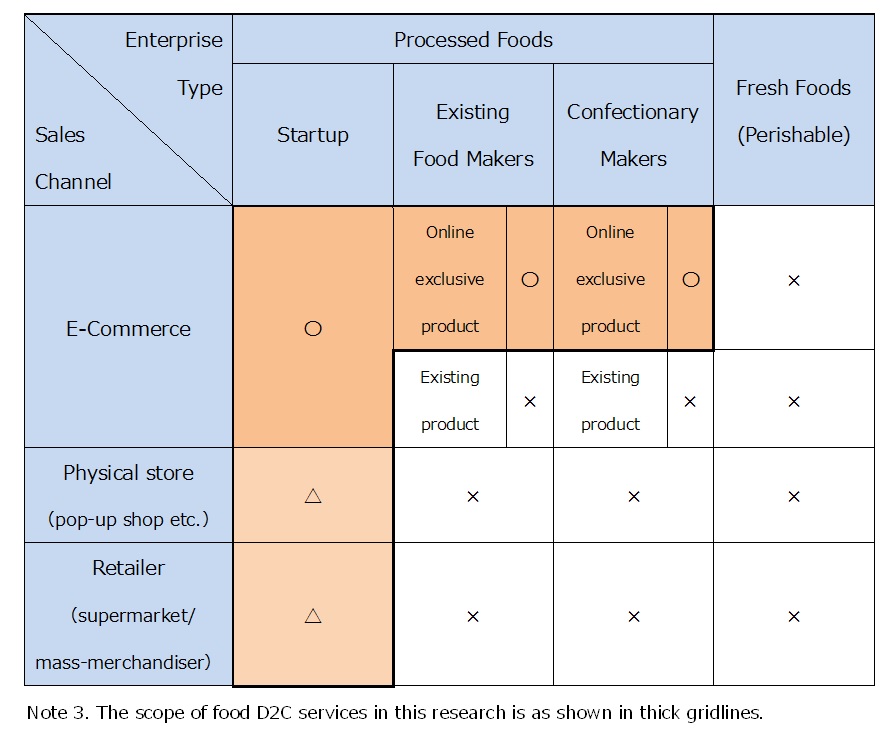No.2705
Food D2C Services Market in Japan: Key Research Findings 2021
Food Industry Going D2C, the Business Model Gathering Attention
Yano Research Institute (the President, Takashi Mizukoshi) has conducted a survey on the food D2C (Direct to Consumer) services market in Japan, and explored the market trends, the trends by category and market players, and the future perspective.


Market Overview
In general, D2C (Direct to Consumer) refers to a business model in which a company sells independently planned/produced items directly to consumers by doing away with intermediaries or retailers, particularly through online channel. Food D2C services in this research is defined as a business model (of food sector) that place importance on direct engagement with consumers (users) by selling the product that one has solely developed/manufactured (including OEM) directly to consumers mainly via in-house e-commerce sites.
While the food mail order market is in favorable conditions, in the last 2-3 years the food D2C services market is also showing significant growth. Size of the food D2C services market is expected to hit 34,000 million yen in FY2020, 158.1% of the previous fiscal year..
In addition to the fact that established brands grew their top line for having their manufacturing and sales structure ready for full-scale customer acquisition, in FY2020 there were quite a few players entering the market. The increase of sales per business and the rise of new market players are the two factors that augmented the market’s rapid growth. In FY2020, the market expansion was also amplified by the increase of demand for food mail orders and food deliveries due to the spread of COVID-19.
Since the food D2C is an emerging market, subsequently the market size is still small; nonetheless, the growth is picking up speed.
Noteworthy Topics
A Trend of Giant Food/Beverage Makers Going D2C
Until recently, food D2C brands were mostly rolled out by startups. However, as D2C garners attention, food and beverage giants have embraced D2C brands, or have taken similar steps such as producing online-only products. While COVID-19 calamity impacts the flow of people, a traditional brick-and-mortar business (product distribution from food wholesalers to retailers) is changing, and large food/beverage makers are in need to optimize their distribution channels for achieving digital transformation (DX) in the future. For this aspect, they focus on D2C model, which enables direct sales of products solely under their own brand.
There is a speculation that inquiries from large food/beverage makers to D2C business support service providers, such as D2C platform services and consulting services, have increased significantly in 2020, especially under the influence of COVID-19 pandemic. As it is assumed that there are many companies getting prepared behind closed doors, more food/beverage giants going D2C is expected to start in 2021.
Future Outlook
Changes in taste among consumers have developed the D2C services market to be open not only to general products by mass-production but also to niche products meeting individual preferences. Going D2C is expected to increase in popularity for food businesses including food giants even more in the coming years. Encouraged by increasing visibility of D2C brands and a rise of food e-commerce, the market is predicted to continue to grow.
Although online sales will become a core of business, it is expected that going omnichannel*, including brick-and-mortar sales, is likely to increase. Further growth is anticipated as a virtuous cycle created by an integrated and seamless customer experience across channels, online and offline, is expected to boost the market expansion.
*Omnichannel is a cross-channel sales approach that integrates the different touchpoints and channels of shopping available to consumers (users), including online and offline.
Research Outline
2.Research Object: Food companies in D2C business, D2C business support service providers
3.Research Methogology: Face-to-face interviews by the expert researchers (including online interviews), survey via telephone/email, and literature research
What is the Food D2C Services Market?
In general, D2C (Direct to Consumer) refers to a business model in which a company sells independently planned/produced items directly to consumers by doing away with intermediaries or retailers, particularly through online channel. Food D2C services in this research is defined as a business model (of food sector) that place importance on direct engagement with consumers (users) by selling the product that one has solely developed/manufactured (including OEM) directly to consumers mainly via in-house e-commerce sites. (For details, refer to the chart “Scope of Food D2C Services”.)
Scope of Food D2C Services in this research:
*1. Online sales of purchased products (online sales services of products developed/manufactured by other company) are excluded. A type of product to be covered is processed foods only; i.e. direct sales of three major fresh foods (fruits and vegetables, meat and poultry, and fish and seafood) are excluded.
*2. Online sales of legacy products that are sold chiefly offline at retailers, and spin-offs of legacy products such as “online exclusive flavors” are excluded. Nevertheless, online-exclusive products of existing makers which applies to the definition above are included.
*3. Sales by legacy confectionaries and their online sales are excluded. However, products of online businesses that are sold offline at physical stores or pop-up shops (temporary retail stores that open for a short period of time) as a place of customer experience or a customer touchpoint are included.
<Products and Services in the Market>
Processed Food, Confectionery, Beverage/Alcoholic Drinks, Health Food (Supplement)
Published Report
Contact Us
The copyright and all other rights pertaining to this report belong to Yano Research Institute.
Please contact our PR team when quoting the report contents for the purpose other than media coverage.
Depending on the purpose of using our report, we may ask you to present your sentences for confirmation beforehand.